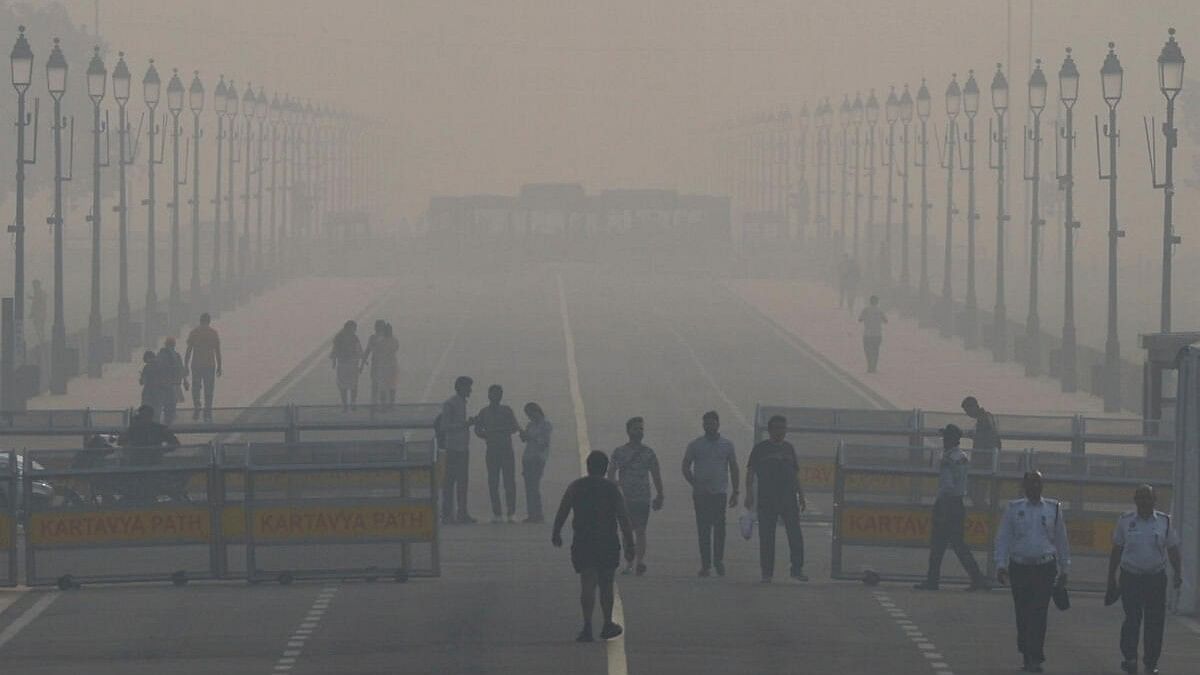
People walk on 'Kartavya Path' amidst the morning smog in New Delhi, India.
Credit: PTI Photo
New Delhi: With air quality in the national capital worsening as "very poor", with several areas falling into "severe" zone, the Supreme Court on Wednesday reminded the Centre and state governments of the right of the citizens’ to live with dignity and in a pollution free environment.
Noting instances of stubble burning in neighbouring states, a bench of Justices Abhay S Oka, Ahsanuddin Amanullah and Augustine George Masih pulled up the Centre for rendering the Environmental Protection Act "toothless" by substituting the provision for prosecution of the wrongdoers with the recovery of penalty.
The bench also noted that Commission for Air Quality Management in National Capital Region and Adjoining Areas Act of 2021 (CAQM Act) was enacted without creating required machinery for implementing the provision to curb air pollution.
Taking up the matter related to air pollution, the bench said these are not the matter of only implementing the existing laws, these are the matters of blatant violation of fundamental right guaranteed under Article 21 of the Constitution.
The court said that governments have to address the question of how they are going to protect the right of citizens to live with dignity and a pollution free environment.
“Therefore, it is high time that governments and all authorities note that this litigation is not an adversarial litigation. This litigation is only to ensure that laws related to the environment are strictly complied with so that constitutional rights of citizens are upheld," the bench said.
The chief secretaries of both Haryana and Punjab were present in the court and made submissions before the bench regarding the steps taken to curb the menace of stubble burning.
The bench said what precise action has been taken by a large number of officers is specifically not placed on record. Haryana chief secretary said instances of stubble burning have been reduced considerably.
The court noted in case of both governments, Haryana and Punjab, selective action has been taken and in some cases, governments claimed that they have recovered the compensation and in few cases they claimed that they have registered FIRs, while the environmental compensation stated to be recovered is minimal.
Referring to amendment made to Section 15 of Environment Protection Act, the bench said, “The provision has been rendered completely ineffective due to inaction on the part of government of India.”
The court also found no appointment of adjudicating officer has been made, though a period of more than 6 months has elapsed, and the law enforcing machinery cannot impose penalty under Section 15.
“In the absence of machinery created by the government of India, Section 15 has been amended and become toothless, and there is nothing in the hands of law enforcing authorities to strictly enforce provision of Environment Protection Act,” the bench said.
“Therefore, those who violate the laws related to the environment are scot-free, as no action can be taken against them," the bench said.
Additional solicitor general Aiswarya Bhati assured the court that within 14 days, the entire machinery will be in existence.
The court noted this year, there are 1084 identified cases of stubble burning in Punjab.
“However, compensation has been recovered from 473 persons. As far as Haryana is concerned there are 419 cases identified. FIR lodged against 32 of the wrongdoers and in case of 320 wrongdoers’ nominal compensation has been recovered. Prime facie it appears to us that the penal provisions are not implemented by both states,” the court said.
Bhati said that CAQM has issued notices to senior administrative officials of Punjab and Haryana besides officials of the state pollution control boards. She said the commission has sought their response as to why action should not be taken against them.
The bench, however, asked her, "Who is taking your notices seriously as the procedure is not provided under the law."
The bench said that penal action should be taken against those officials who have not implemented the directions, instead of setting criminal law in motion, the commission has merely issued show cause notices.
"Please tell your chairperson of CAQM not to bail out these officials. We know what is happening on the ground," the bench said. The apex court was informed that over 1,000 cases of stubble burning have taken place in several districts of Punjab like Amritsar, Ferozepur, Patiala, Sangrur, and Taran Taran.
The bench stressed the coordination between the commission and state authorities is absolutely necessary.
It also noted that an important committee under the Act is not functioning properly because the number of members are remaining absent.
The bench was informed that show-cause notices have been sent to the secretary (environment) and additional chief secretary (agriculture) of both Punjab and Haryana.
On October 16, the Supreme Court had deprecated the apathy shown by state governments, Punjab and Haryana, in finding a solution to the menace of stubble burning, one of the major contributors towards air pollution in the capital, which has existed for decades.
